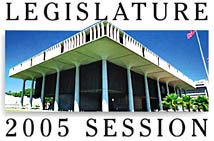Senate tackles
funeral plans
A proposal would set standards
to protect consumers who buy
pre-need service contracts
As a retired Episcopal Church pastor, the Rev. George Lee has counseled many families who have had to make funeral arrangements for loved ones.
|
|
The growing number of people who purchase such contracts was one of the reasons why Lee and others went before a legislative panel last week urging greater state oversight of how prepaid contracts are managed.
A proposal to establish new standards for prepaid funeral plans was introduced this year after recent media reports of a woman who lost all $1,800 she had paid into a $5,000 plan after she became ill and missed two $50 payments. The funeral provider declared her in default and, as allowed by law, kept all of the money already paid, advocates said.
When she died, the woman was cremated at state expense and her remains turned over to family members.
"Now that doesn't sound like a very fair business practice," Lee said.
Lawmakers agree.
The Senate has advanced a proposal that would allow buyers to cancel a prepaid contract at any time before the death of the beneficiary and recoup most, if not all, of the money already paid into the plan. Funeral operators also would have to give written, detailed notice when a plan has been declared in default for nonpayment and is being canceled. But operators also would have to give buyers three months to try and make the payments to bring the plan up-to-date.
Under current law, funeral operators can keep 30 percent of prepaid money if a customer cancels, and 100 percent if the contract is declared in default.
"I think the concern is that people's plans were being canceled and they didn't have any recourse and we wanted to address that," said Sen. Brian Kanno (D, Kalaeloa-Makakilo), who introduced the bill that has passed out of the Senate.
A House panel heard the proposal last week, and is expected to advance it tomorrow.
"This is about making sure that people are protected when they're most vulnerable," said House Consumer Protection Vice Chairman Brian Schatz (D, Tanatalus-Makiki). "The idea that somebody can be paying into a prepaid funeral plan for more than 10 years and then, if they're two days late with their payment, they lose everything, it's just not fair."
Lawmakers say they want to balance the interest of consumers with those of funeral operators, who say the proposal could drive them out of business if 100 percent of prepaid costs have to be returned upon cancellation of a contract.
"The industry needs the 30 percent ... in order to be able to afford to issue the pre-need contracts," said Oren Chikamoto, an attorney representing Hawaiian Memorial Life Plan Ltd., which operates Hawaiian Memorial Park, Greenhaven Memorial Park and Borthwick Mortuaries on Oahu and Kauai.
He said the actual costs incurred when someone purchases a pre-need plan usually amount to 30 percent to 38 percent of the contract's total amount. Those funds cover costs such as commissions paid to counselors and salaries for employees who oversee the contracts, among other things.
Chikamoto noted that some states, including Mississippi and North Dakota, allow funeral operators to retain as much as 50 percent of funds received monthly for pre-need services.
Supporters of the proposed legislation argue that Hawaii needs to toughen its regulations on prepaid funeral contracts because of how quickly the market is growing.
According to the seniors advocacy group AARP, an estimated $25 billion has been invested in pre-need funeral and burial trusts and insurance plans nationwide.
"We believe that the time has come to address consumer protection within pre-need funeral and burial statutes," AARP Hawaii advocacy director Alicia Maluafiti told lawmakers. "We think that this bill levels the playing field (for consumers)."
The proposed legislation also comes after the Attorney General's Office sued the state's largest funeral services business in December, saying it wanted to make sure the company doesn't mismanage millions of dollars held in trust for customers.
The lawsuit, which was filed against RightStar Hawaii Management Inc., seeks to have a state master appointed to oversee accounting of funeral trusts.
Officials with RightStar, a company whose trustees include former Gov. John Waihee, have said they are working with the Attorney General's Office to resolve the issues. RightStar and its subsidiaries operate cemeteries on all islands including Valley of the Temples, Kona Memorial, Homelani Memorial and Maui Memorial.
[News] [Business] [Features] [Sports] [Editorial] [Do It Electric!]
[Classified Ads] [Search] [Subscribe] [Info] [Letter to Editor]
[Feedback]

